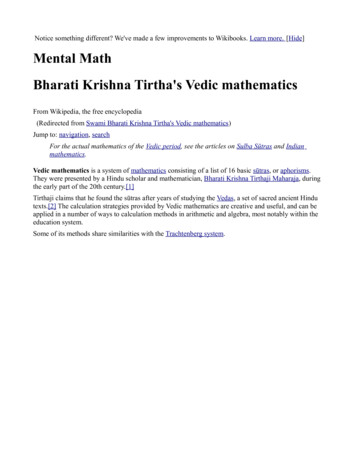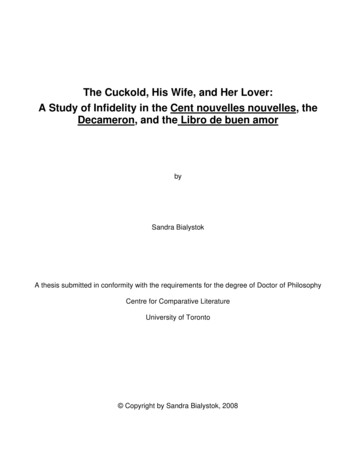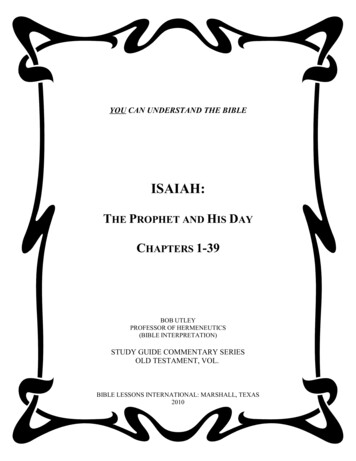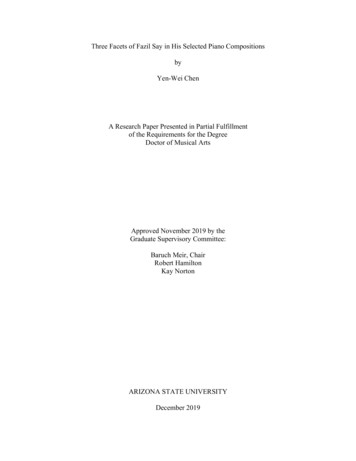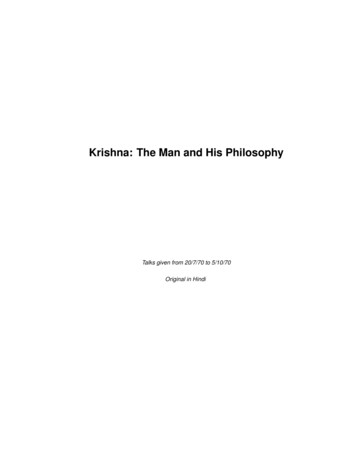
Transcription
Krishna: The Man and His PhilosophyTalks given from 20/7/70 to 5/10/70Original in Hindi
CHAPTER 1The Future Belongs to Krishna20 July 1970 pm in C.C.I. ChambersQuestion 1QUESTIONER: WHAT ARE THE DISTINGUISHING VIRTUES OF KRISHNA THAT MAKE HIMRELEVANT TO OUR TIME? WHAT IS HIS SIGNIFICANCE FOR US? PLEASE EXPLAIN.Krishna is utterly incomparable, he is so unique. Firstly, his uniqueness lies in the fact that althoughKrishna happened in the ancient past he belongs to the future, is really of the future. Man hasyet to grow to that height where he can be a contemporary of Krishna’s. He is still beyond man’sunderstanding; he continues to puzzle and battle us. Only in some future time will we be able tounderstand him and appreciate his virtues. And there are good reasons for it.The most important reason is that Krishna is the sole great man in our whole history who reachedthe absolute height and depth of religion, and yet he is not at all serious and sad, not in tears. Byand large, the chief characteristic of a religious person has been that he is somber, serious andsad-looking – like one vanquished in the battle of life, like a renegade from life. In the long line ofsuch sages it is Krishna alone who comes dancing, singing and laughing.Religions of the past were all life-denying and masochistic, extolling sorrow and suffering as greatvirtues. If you set aside Krishna’s vision of religion, then every religion of the past presented a sadand sorrowful face. A laughing religion, a religion that accepts life in its totality is yet to be born.And it is good that the old religions are dead, along with them, that the old God, the God of our oldconcepts is dead too2
CHAPTER 1. THE FUTURE BELONGS TO KRISHNAIt is said of Jesus that he never laughed. It was perhaps his sad look and the picture of his physicalform on the cross that became the focal point of at traction for people, most of whom are themselvesunhappy and miserable. In a deep sense Mahavira and Buddha are against life too. They are infavor of some other life in some other world; they support a kind of liberation from this life.Every religion, up to now, has divided life into two parts, and while they accept one part they deny theother, Krishna alone accepts the whole of life. Acceptance of life in its totality has attained full fruitionin Krishna. That is why India held him to be a perfect incarnation of God, while all other incarnationswere assessed as imperfect and incomplete. Even Rama is described as an incomplete incarnationof God. But Krishna is the whole of God.And there is a reason for saying so. The reason is that Krishna has accepted and absorbedeverything that life is.Albert Schweitzer made a significant remark in criticism of the Indian religion. He said that thereligion of this country is life negative. This remark is correct to a large extent, if Krishna is left out.But it is utterly wrong in the context of Krishna. If Schweitzer had tried to understand Krishna hewould never have said so.But it was unfortunate that we did not allow Krishna to influence our life in a broad way. He remainsa lonely dancing island in the vast ocean of sorrow and misery that is our life. Or, we can say heis a small oasis of joyous dancing and celebration in the huge desert of sadness and negativity, ofsuppression and condemnation that we really are. Krishna could not influence the whole spectrumof our life, and for this we are alone to blame. Krishna is not in the least responsible for it. We werenot that worthy, that deserving, to have him, to imbibe him, to absorb him.Up to now, man’s mind has thought of and looked at life in fragments – and thought dialectically.The religious man denies the body and accepts the soul. And what is worse, he creates a conflict, adichotomy between the body and spirit. He denies this world, he accepts the other world, and thuscreates a state of hostility between the two. Naturally our life is going to be sad and miserable if wedeny the body, because all our life’s juice – its health and vitality, its sensitivities and beauty, all itsmusic – has its source in the body. So a religion that denies and denounces the body is bound to beanemic and ill, it has to be lackluster. Such a religion is going to be as pale and lifeless as a dry leaffallen from a tree. And the people who follow such a religion, who allow themselves to be influencedand conditioned by it, will be as anemic and prone to death as these leaves are.Krishna alone accepts the body in its totality. And he accepts it not in any selected dimension butin all its dimensions. Apart from Krishna, Zarathustra is another. About him it is said he was bornlaughing. Every child enters this world crying. Only one child in all of history laughed at the timeof his birth, and that was Zarathustra. And this is an index – an index of the fact that a happy andlaughing humanity is yet to be born. And only a joyful and laughing humanity can accept Krishna.Krishna has a great future. After Freud the world of religion is not going to be the same as it wasbefore him. Freud stands as a watershed between the religions of the past and the religion of thefuture. With Freud a great revolution has taken place and man’s consciousness has achieved abreakthrough. We shall never be the same again after Freud. A new peak of consciousness hasbeen touched and a new understanding, an altogether new perspective, a new vision of life hascome into being. And it is essential to understand it rightly.Krishna: The Man and His Philosophy3Osho
CHAPTER 1. THE FUTURE BELONGS TO KRISHNAThe old religions taught suppression as the way to God. Man was asked to suppress everything –his sex, his anger, his greed, his attachments – and then alone would he find his soul, would heattain to God. This war of man against himself has continued long enough. And in the history ofthousands of years of this war, barely a handful of people, whose names can be counted on one’sfingers, can be said to have found God. So in a sense we lost this war, because down the centuriesbillions of people died without finding their souls, without meeting God.Undoubtedly there must be some basic flaw, some fundamental mistake in the very foundation ofthese religions.It is as if a gardener has planted fifty thousand trees and out of them only one tree flowers – and yetwe accept his scripture on gardening on the plea that at least one tree has blossomed. But we failto take into consideration that this single tree might have been an exception to the rule, that it mighthave blossomed not because of the gardener, but in spite of him. The rest of the fifty thousand trees,those that remained stunted and barren, are enough proof the gardener was not worth his salt.If a Buddha, a Mahavira or a Christ attains to God in spite of these fragmentary and conflict-rid denreligions, it is no testimony to the success of these religions as such. The success of religion, or letus say the success of the gardener, should be acclaimed only when all fifty thousand trees of hisgarden, with the exception of one or two, achieve flowering. Then the blame could be laid at thefoot of the one tree for its failure to bloom. Then it could be said that this tree remained stunted andbarren in spite of the gardener.With Freud a new kind of awareness has dawned on man: that suppression is wrong, thatsuppression brings with it nothing but self-pity and anguish. If a man fights with himself he canonly ruin and destroy himself. If I make my left hand fight with my right hand, neither is going to win,but in the end the contest will certainly destroy me. While my two hands fight with themselves, I andI alone will be destroyed in the process. That is how, through denial and suppression of his naturalinstincts and emotions, man became suicidal and killed himself.Krishna alone seems to be relevant to the new awareness, to the new understanding that came toman in the wake of Freud and his findings. It is so because in the whole history of the old humanityKrishna alone is against repression.He accepts life in all its facets, in all its climates and colors. He alone does not choose he acceptslife unconditionally. He does not shun love; being a man he does not run away from women. Asone who has known and experienced God, he alone does not turn his face from war. He is full oflove and compassion, and yet he has the courage to accept and fight a war. His heart is utterly nonviolent, yet he plunges into the fire and fury of violence when it becomes unavoidable. He acceptsthe nectar, and yet he is not afraid of poison.In fact, one who knows the deathless should be free of the fear of death. And of what worth is thatnectar which is afraid of death? One who knows the secret of non-violence should cease to fearviolence. What kind of non-violence is it that is scared of violence? And how can the spirit, the soul,fear the body and run away from it? And what is the meaning of God if he cannot take the whole ofthis world in his embrace?Krishna: The Man and His Philosophy4Osho
CHAPTER 1. THE FUTURE BELONGS TO KRISHNAKrishna accepts the duality, the dialectics of life altogether and therefore transcends duality. Whatwe call transcendence is not possible so long as you are in conflict, so long as you choose onepart and reject the other. Transcendence is only possible when you choicelessly accept both partstogether, when you accept the whole.That is why Krishna has great significance for the future. And his significance will continue to growwith the passage of time. When the glow and the glamor of all other godmen and messiahs hasdimmed, when the suppressive religions of the world have been consigned to the wastebasket ofhistory, Krishna’s flame will be heading towards its peak, moving towards the pinnacle of its brilliance.It will be so because, for the first time, man will be able to comprehend him, to understand him andto imbibe him. And it will be so because, for the first time, man will really deserve him and hisblessings.It is really arduous to understand Krishna. It is easy to understand that a man should run away fromthe world if he wants to find peace, but it is really difficult to accept that one can find peace in thethick of the marketplace. It is understandable that a man can attain to purity of mind if he breaksaway from his attachments, but it is really difficult to realize that one can remain unattached andinnocent in the very midst of relationships and attachments, that one can remain calm and still liveat the very center of the cyclone. There is no difficulty in accepting that the flame of a candle willremain steady and still in a place well secluded from winds and storms, but how can you believethat a candle can keep burning steadily even in the midst of raging storms and hurricanes? So it isdifficult even for those who are close to Krishna to understand him.For the first time in his long history man has attempted a great and bold experiment through Krishna.For the first time, through Krishna, man has tested, and tested fully his own strength and intelligence.It has been tested and found that man can remain, like a lotus in water, untouched and unattachedwhile living in the throes of relationship. It has been discovered that man can hold to his love andcompassion even on the battlefield, that he can continue to love with his whole being while wieldinga sword in his hand.It is this paradox that makes Krishna difficult to understand. Therefore, people who have loved andworshipped him have done so by dividing him into parts, and they have worshipped his differentfragments, those of their liking. No one has accepted and worshipped the whole of Krishna, noone has embraced him in his entirety. Poet Surdas sings superb hymns of praise to the Krishnaof his childhood, Bal. krishna. Surdas’ Krishna never grows up, because there is a danger with agrown-up Krishna which Surdas cannot take. There is not much trouble with a boy Krishna flirtingwith the young women of his village, but it will be too much if a grown-up Krishna does the same.Then it will be difficult to understand him.After all, we can understand something on our own plane, on our own level. There is no way tounderstand something on a plane other than ours.So for their adoration of Krishna, different people have chosen different facets of his life. Thosewho love the Geeta will simply ignore the BHAGWAD, because the Krishna of the GEETA is sodifferent from the Krishna of the BHAGWAD Similarly, those who love the BHAGWAD will avoidgetting involved with the GEETA. While the Krishna of the GEETA stands on a battlefield surroundedby violence and war, the Krishna of the BHAGWAD is dancing, singing and celebrating. There isseemingly no meeting-point whatsoever between the two.Krishna: The Man and His Philosophy5Osho
CHAPTER 1. THE FUTURE BELONGS TO KRISHNAThere is perhaps no one like Krishna, no one who can accept and absorb in himself all thecontradictions of life, all the seemingly great contradictions of life. Day and night, summer andwinter, peace and war, love and violence, life and death – all walk hand in hand with him. That iswhy everyone who loves him has chosen a particular aspect of Krishna’s life that appealed to himand quietly dropped the rest.Gandhi calls the GEETA his mother, and yet he cannot absorb it, because his creed of non-violenceconflicts with the grim inevitability of war as seen in the GEETA. So Gandhi finds ways to rationalizethe violence of the GEETA: he says the war of Mahabharat is only a metaphor, that it did not actuallyhappen. This war, Gandhi says over and over again, represents the inner war between good andevil that goes on inside a man. The Kurushetra of the GEETA, according to Gandhi, is not a realbattlefield located somewhere on this earth, nor is the Mahabharat an actual war. It is not thatKrishna incites Arjuna to fight a real Mahabharat, Mahabharat only symbolizes the inner conflict andwar of man, and so it is just a parab
Krishna: The Man and His Philosophy 3 Osho. CHAPTER 1. THE FUTURE BELONGS TO KRISHNA The old religions taught suppression as the way to God. Man was asked to suppress everything – his sex, his anger, his greed, his attachments – and then alone would he find his soul, would he attain to God. This war of man against himself has continued long enough. And in the history of thousands of years .
